UniWeb Review: Social media “click a button” app Ponzi
 UniWeb fails to provide ownership or executive information on its website.
UniWeb fails to provide ownership or executive information on its website.
UniWeb’s website domain (“uniwebcorp.com”), was privately registered on May 10th, 2025.
It should be noted that everything on UniWeb’s website is baloney. The website exists solely to direct visitors to download UniWeb’s app.
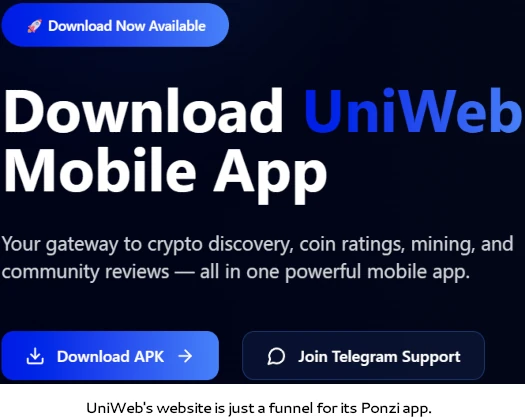
Official UniWeb communications feature Chinese:
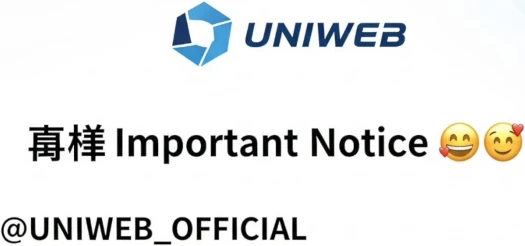
This suggests whoever is running UniWeb has ties to China.
As always, if an MLM company is not openly upfront about who is running or owns it, think long and hard about joining and/or handing over any money.
UniWeb’s Products
UniWeb has no retailable products or services.
Promoters are only able to market UniWeb promoter membership itself.
UniWeb’s Compensation Plan
UniWeb promoters invest tether (USDT). This is done on the promise of advertised returns:
- Starter Plan – invest 20 to 80 USDT and receive 1.5% a day
- Growth Plan – invest 100 to 250 USDT and receive 2% a day
- Premium Plan – invest 300 to 500 USDT and receive 2.15% a day
- Star 1 – invest 1000 USDT and receive 2.3% a day (must recruit 12 promoter investors and have a total downline of 30 promoter investors to unlock)
- Star 2 – invest 2500 USDT and receive 2.5% a day (must recruit 25 promoter investors and have a total downline of 60 promoter investors to unlock)
- Star 3 – invest 5000 USDT and receive 2.6% a day (must recruit 35 promoter investors and have a total downline of 85 promoter investors to unlock)
- Star 4 – invest 10,000 USDT and receive 2.75% a day (must recruit 45 promoter investors and have a total downline of 130 promoter investors to unlock)
- Star 5 – invest 17,000 USDT and receive 3% a day (must recruit 60 promoter investors and have a total downline of 180 promoter investors to unlock)
- Star 6 – invest 25,000 USDT and receive 3.25% a day (must recruit 75 promoter investors and have a total downline of 230 promoter investors to unlock)
- UniWeb Star – invest 35,000 USDT and receive 3.5% a day (must recruit 90 promoter investors and have a total downline of 280 promoter investors to unlock)
Note that for the “Star” and higher investment tiers, downline promoters are only counted down three levels of recruitment.
The MLM side of UniWeb pays on recruitment of promoter investors.
Referral Commissions
UniWeb pays referral commissions on invested USDT down three levels of recruitment (unilevel):

Referral commission rates are determined by which investment plan a UniWeb promoter has invested at:
- Start Plan pays 13% on level 1 (personally recruited promoters), 5% on level 2 and 2% on level 3
- Growth Plan pays 14% on level 1, 6% on level 2 and 3% on level 3
- Premium Plan pays 15% on level 1, 7% on level 2 and 3% on level 3
- Star 1 pays 16% on level 1, 8% on level 2 and 3% on level 3
- Star 2 pays 17% on level 1, 8% on level 2, 3% on level 3 and 1% on level 4
- Star 3 pays 18% on level 1, 8% on level 2, 4% on level 3 and 1% on level 4
- Star 4 pays 19% on level 1, 9% on level 2, 5% on level 3 and 1% on levels 4 and 5
- Star 5 pays 20% on level 1, 10% on level 2, 5% on level 3 and 1% on levels 4 to 6
- Star 6 pays 21% on level 1, 11% on level 2, 6% on level 3 and 1% on levels 4 to 6
- UniWeb Star pays 22% on level 1, 12% on level 2, 7% on level 3 and 1% on levels 4 to 7
Recruitment Bonus
UniWeb rewards promoters for building a downline of promoter investors:
- recruit 2 promoter investors, build a downline of 20 promoter investors and receive 20 USDT
- recruit 4 promoter investors, build a downline of 50 promoter investors and receive 70 USDT
- recruit 6 promoter investors, build a downline of 100 promoter investors and receive 140 USDT
- recruit 10 promoter investors, build a downline of 250 promoter investors and receive 220 USDT
- recruit 13 promoter investors, build a downline of 500 promoter investors and receive 350 USDT
- recruit 18 promoter investors, build a downline of 750 promoter investors and receive 430 USDT
- recruit 22 promoter investors, build a downline of 1000 promoter investors and receive 620 USDT
- recruit 30 promoter investors, build a downline of 6000 promoter investors and receive 1800 USDT
- recruit 35 promoter investors, build a downline of 8500 promoter investors and receive 3000 USDT
- recruit 40 promoter investors, build a downline of 15,000 promoter investors and receive 5000 USDT
- recruit 50 promoter investors, build a downline of 40,000 promoter investors and receive 10,000 USDT
- recruit 56 promoter investors, build a downline of 70,000 promoter investors and receive 20,000 USDT
- recruit 60 promoter investors, build a downline of 100,000 promoter investors and receive 25,000 USDT
- recruit 70 promoter investors, build a downline of 500,000 promoter investors and receive 100,000 USDT
Note that for the first to seventh Recruitment Bonus tiers, downline promoter investors are only counted down three levels of recruitment.
For higher tiers downline promoter investors are counted down four levels of recruitment.
Joining UniWeb
UniWeb promoter membership is free.
Full participation in the attached income opportunity requires a minimum 20 USDT investment.
UniWeb Conclusion
UniWeb is yet another “click a button” app Ponzi scheme.
UniWeb’s “click a button” Ponzi ruse is social media manipulation:
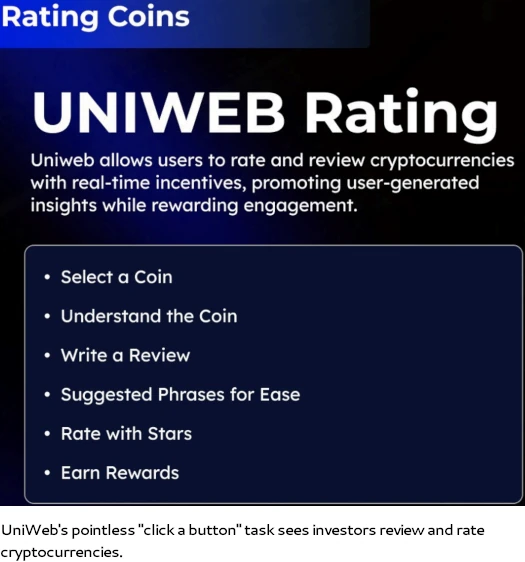
The presented ruse is UniWeb affiliates write crypto coin/token reviews and provide a star rating.
At the conclusion of each written review a button must be clicked to submit. Each submitted review counts as a task.
The more a UniWeb affiliate invests the more buttons they have to click each day.
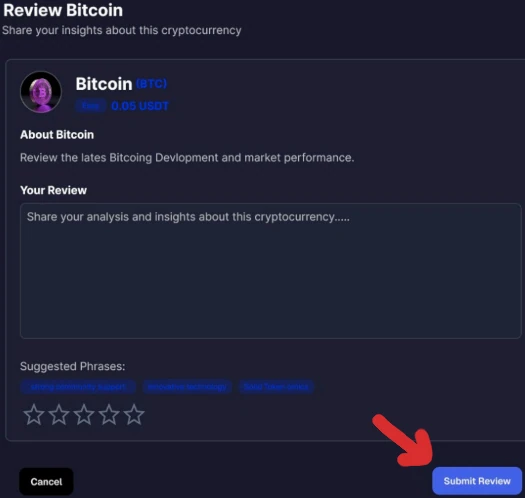
UniWeb’s “click a button” ruse is detached from its claimed revenue generation:
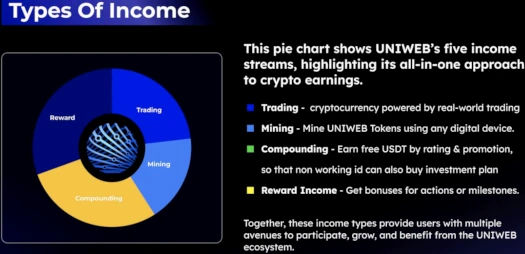
UniWeb of course fails to provide verifiable evidence it generates external revenue of any kind.
None of this is supposed to be make sense by design. UniWeb targets brainless investors who aren’t supposed to think beyond investing and clicking a button in a dodgy app to qualify for a daily ROI.
As of August 2025, SimilarWeb was tracking 100% of UniWeb’s monthly website traffic from India.
In reality clicking a button inside UniWeb’s app does nothing. All UniWeb does is recycling newly invested funds to pay earlier investors.
UniWeb is part of a group of “click a button” app Ponzis that emerged in late 2021.
Examples of already collapsed “click a button” app Ponzis using the same social media ruse include HAHM, GTM and Radar Media (aka KJBT).
Since 2021 BehindMLM has documented hundreds of “click a button” app Ponzis. Most of them last a few weeks to a few months before collapsing.
“Click a button” app Ponzis disappear by disabling both their websites and app. This tends to happen without notice, leaving the majority of investors with a loss (inevitable Ponzi math).
In the lead up to a collapse, “click a button” Ponzi investors also tend to find their accounts locked. This typically coincides with a withdrawal request.
As part of a collapse, “click a button” Ponzi scammers often initiate recovery scams. This sees the scammers demand investors pay a fee to access funds and/or re enable withdrawals.
If any payments are made withdrawals remain disabled or the scammers cease communication.
Organized crime interests from China operate scam factories behind “click a button” Ponzis from south-east Asian countries.
In September 2024, the US Department of Treasury sanctioned Cambodian politician Ly Yong Phat over ties to Chinese human trafficking scam factories.
Through various companies he owns, Phat is alleged to shelter Chinese scammers operating out of Cambodia.
Myanmar claims to have deported over 50,000 Chinese scam factory scammers since October 2023. With “click a button” app scams continuing to feature on BehindMLM though, it is clearly not enough.
In late January 2025, Chinese ministry representatives visited Thailand. The stated aim of the visit was to tackle organized Chinese crime gangs operating from Myanmar.
In early February 2025, Thailand announced it had cut power, internet access and petrol supplies to Chinese scam factories operating across its border with Myanmar.
As of February 20th, Thai and Chinese authorities claim ten thousand trafficked hostages had been freed from Myanmar compounds.
Also on February 20th, five Chinese crime bosses were nabbed in a wider raid of four hundred and fifty arrests in the Philippines.
On March 19th it was reported that, despite the recent raids and arrests, “up to 100,000 people” are still working in Chinese Myanmar scam factories.
As of April 2025 and in response to a crackdown across Asia, newly opened Chinese scam factories have been reported in Nigeria, Angola and Brazil.
Myawaddy is an area in Myanmar along the Thai border. Myawaddy is under the control of the Karen National Army (KNA).
The KNA, led by warlord Chit Thu (right) and sons Saw Htoo Eh Moo and Saw Chit Chit, protect and profit from organized Chinese criminals running “click a button” Ponzi scam factories.
 On May 5th the US imposed sanctions on Chit Thu (right).
On May 5th the US imposed sanctions on Chit Thu (right).
The Treasury said the warlord, Saw Chit Thu, is a central figure in a network of illicit and highly lucrative cyberscam operations targeting Americans.
The move puts financial sanctions on Saw Chit Thu, the Karen National Army that he heads, and his two sons, Saw Htoo Eh Moo and Saw Chit Chit, the department said in a statement, freezing any U.S. assets they may hold and generally barring Americans from doing business with them.
Britain and the European Union have already imposed sanctions on Saw Chit Thu.
A May 25th report cites Myanmar and Loas as having “towering scam economies”. Cambodia however is reported to be a hotspot for Chinese criminal activity.
Cambodia is likely the absolute global epicentre of next-gen transnational fraud in 2025 and is certainly the country most primed for explosive growth going forward.
Cambodia is becoming the centre of an exploding global scam economy driven primarily by Chinese organised crime.
Chinese gangs are reported to operate in Cambodia under the protection of unnamed local politicians.
In June 2025, Amnesty International claimed Cambodia’s government was
“deliberately ignoring” abuses by cybercrime gangs who have trafficked people from across the world, including children, into slavery at brutal scam compounds.
The London-based group said in a report that it had identified 53 scam centres and dozens more suspected sites across the country, including the Southeast Asian nation’s capital, Phnom Penh.
The prison-like compounds were ringed by high fences with razor wire, guarded by armed men and staffed by trafficking victims forced to defraud people across the globe, it said, with those inside subjected to punishments including shocks from electric batons, confinement in dark rooms and beatings.
In July 2025 Cambodia arrested over 1000 cybercrime suspects. Twenty-seven of those arrested were members of Chinese criminal gangs.
Regardless of which country they operate from, ultimately the same group of Chinese scammers are believed to be behind the “click a button” app Ponzi plague.

